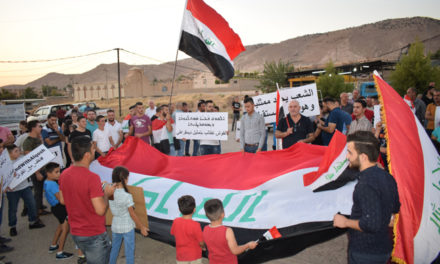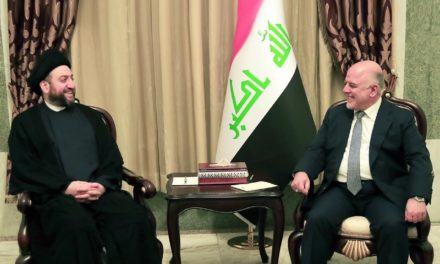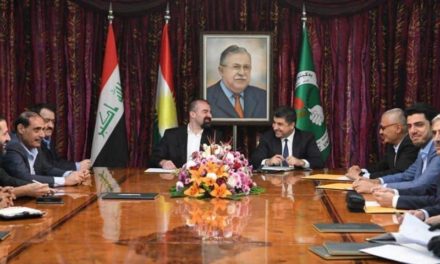Prime Minister Mustafa Al-Kadhimi began talks with Iranian leaders soon after he arrived in the Iranian capital on 21 July on his first official visit abroad since he took office in May. Kadhimi’s arrival in Tehran comes a day after his planned visit to Saudi Arabia was postponed following news of King Salman bin Abdulaziz’s hospitalization.
According to many analysts, Kadhimi’s recent visit to Iran and his forthcoming visit to Washington and a possibly rescheduled visit to Saudi Arabia will determine the future fate of Iraq’s political fortunes on several fronts. The priority for Kadhimi’s government was to discuss the current turbulent political situation and to define a positive programme for economic, political and security relations with Tehran.
On the economic front, Tehran sees Iraq as a major channel for foreign trade and a vital avenue for circumventing sanctions. Foreign trade between the two countries reached 12 billion dollars in 2019, and the Iranian side aims to reach 20 billion dollars by 2021. The joint Iranian-Iraqi trade commission, established during the visit of the President of the Islamic Republic of Iran, Hassan Rouhani to Iraq, in March 2019, is working towards a number of goals such as reducing customs barriers and ensuring Iranian exports enter Iraq without the payment of duties.
At the same time, the Iranian government believes that the policies of the U.S. administration are a serious obstacle to Iranian-Iraqi relations. Among them, Tehran faces the risk of oil revenues being withheld and Iraq’s exemption from sanctions on Iranian gas and electricity imports being curtailed. Iran has faced tougher sanctions in recent months on account of its economic ties and trading activities with Iraq, Syria and Lebanon. With the emergence of the Saudi proposal and the possibility of satisfying Iraq’s electricity needs through the Saudi pipeline or the GCC, this equation will become even more complicated for Iran.
With regards to matters of national security between Baghdad and Tehran, the latter has expressed certain reservations towards Kadhimi’s policies regarding the recent changes in Iraq. The termination of Falih Fayyad’s tenure as an advisor to the Iraqi National Security Council and the appointment of Qasim Al-A’raji in his place, as well as tasking the former counter-terrorism force commander, Lieutenant General Abdulghani Al-Asadi, with heading the National Security Service, are seen as giving Washington the green light.
In addition, Kadhimi’s agreement allowing the return of the Peshmerga forces to the Joint Operations Command Centre in Kirkuk, which is part of his behind-the-scenes agreement with the Kurdish factions, creates a new front against Iran in Iraq. Moreover, Iran believes that these agreements pave the ground for the return of ethnic and religious conflict to a province which is close to its borders.
Tehran deems Iraq’s strategic talks with the United States, which took place on 11 June 2020, to have departed from their intended purpose, namely the demands by Iran and their political allies in Iraq to implement the Iraqi Parliament’s resolution calling for the complete withdrawal of all foreign forces from Iraq. Tehran also believes that the whole purpose behind these talks was to allow the United States a further opportunity to delay and minimize the importance of the complete withdrawal of their forces, as well as reducing the number of allied forces in Iraq. Similarly, the deployment of the patriot missile systems at both Ein al-Assad and Erbil military bases, and testing C-RAMs at the American Embassy in Baghdad’s International Zone, clearly shows the United States’ determination to maintain a military presence to counter Iranian influence in Iraq, and not to embark on an exit strategy.
Finally, it has to be said that the art of foreign policy is to achieve the greatest gains whilst minimising external threats in order to achieve national goals and interests. In the same vein, Kadhimi’s central agenda is intended to reduce the level of conflict and confrontation between the foreign powers vying for influence in Iraq, in order to take advantage of the opportunities for bilateral relations with all sides. Accordingly, the ideal approach is to exploit the potential for better economic relations between the two countries, including establishing economic interdependence whilst maintaining security cohesion in areas such as the preservation of Iraq’s independence, territorial integrity and sovereignty and addressing the common threat of terrorism.
Perhaps Tehran also understands many of the necessities and exigencies that oblige Baghdad to keep the channels of communication and diplomacy open with certain regional and international powers who may be at odds with Tehran’s foreign policy and interests. This much is clear from what some politicians in Iran are saying, when commenting on Prime Minister Mustafa Al-Kadhimi’s visit to Iran and his future visits to the United States of America and Saudi Arabia. Kadhimi is working hard to find a balance in relations with Iran as a neighbour, just as Iran wants to strengthen its ties with Iraq whilst also understanding why Iraq should wish to consolidate its ties with these other countries. Realizing the importance of Iraq’s regional role, Kadhimi wants to improve relations with all three countries as this will have an impact on the domestic situation in Iraq.

Hayder Al-Khafaji
Hayder Al-Khafaji is a researcher on Middle Eastern affairs with a specialist focus on Iraq-Iran relations. He holds a postgraduate certificate in Islamic Studies from Birkbeck College, University of London, and a master’s degree from Middlesex University where he is currently completing a Professional Doctorate in Muslim cultures.










